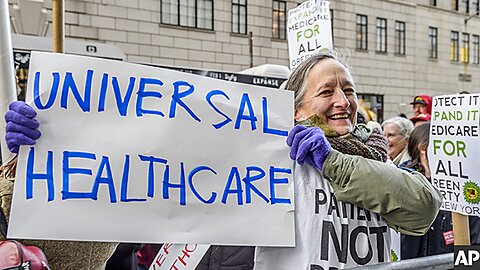Many critiques of US health care begin with the assumption that, as The Economist put it, the United States is “one of the only developed countries where health care is mostly left to the free market.” In truth, among wealthy nations, the United States may have one of the least-free health care markets—and it’s making health care less universal.
In a free market, the government would control 0 percent of health spending. Yet the Organization for Economic Cooperation and Development (OECD) reports that in the United States, the government controls 84 percent of health spending. That’s a larger share than in 27 out of 38 OECD-member nations, including the United Kingdom (83 percent) and Canada (73 percent), each of which has an explicitly socialized health care system. When it comes to government control of health spending, the United States is closer to communist Cuba (89 percent) than the average OECD nation (75 percent).
The idea that the US health sector has “largely unregulated prices,” as the Los Angeles Times has reported, is also incorrect. Direct government price-setting, price floors, and price ceilings determine prices for more than half of US health spending, including virtually all health insurance premiums.
Many think that if prices are excessive, they must be market prices. But in the United States, government price-setting pushes health care prices higher than they would be in a free market. On top of that, the government pushes all medical prices and health insurance premiums upward through tax laws and regulations mandating excessive levels of health insurance.
A few examples illustrate how frequently the government sets prices too high.
- In 2014, Medicare paid long-term care (LTC) hospitals about three times as much as skilled nursing facilities (SNFs) — $1,400 per day versus $450 per day, a per-admission price differential of about $30,000 — to provide similar services to similar patients, without any evidence of additional benefit.
- A 2016 study of acute-care hospitals found that those located “in states with price regulation…tended to be more profitable.”
- When a hospital purchases a physician practice or other facility, Medicare increases the prices it pays for the same people to provide the same services to the same patients in the same location.
- In 2018, the first Trump administration reported, “The Medicare program pays nearly twice as much as it would pay for the same or similar drugs in other countries.”
- The prices Congress sets for “private” Medicare Advantage (MA) plans leave taxpayers paying an average of 20 percent more every time an enrollee switches from traditional Medicare to MA.
These and many other examples of government pricing errors have persisted for decades. Medicare’s excessive prices exhibit greater longevity than Medicare enrollees.
President Trump wants to reduce some of Medicare’s excessive prices. It may be a fool’s errand. The health care industry spends six times what the defense industry does on lobbying Congress. So long as the government keeps setting the prices, Trump is more likely to increase prices where they are lower than to lower them where they are higher.
The only way to reduce prices while reliably maintaining access to care is to make consumers price-sensitive. Experiments have found that within two years of patients becoming more price-sensitive, prices decline for several procedures, from 11 percent for MRI scans to 32 percent for laboratory tests, without reducing access. At high-priced hospitals, prices for hip and knee replacements fell by an average of $10,505 (24 percent). There’s still plenty of room for prices to fall.
Achieving that goal requires eliminating regulatory and tax distortions of market prices and removing government from the business of purchasing health insurance and medical care. The most important steps will be tax reform and entitlement reforms that let consumers own and control all $5.6 trillion in US health spending.
US health care prices are excessive because the government intervenes. When health care operates under free-market principles, prices would fall like they do in other economic sectors, making health care increasingly more universal.
This piece is an adaptation of “US Health Care: The Free-Market Myth,” which appeared today in the journal National Affairs.


